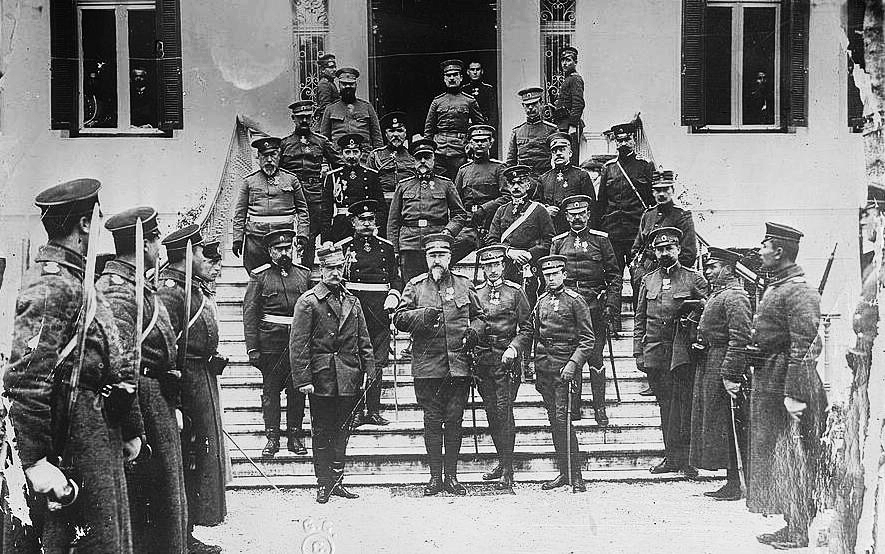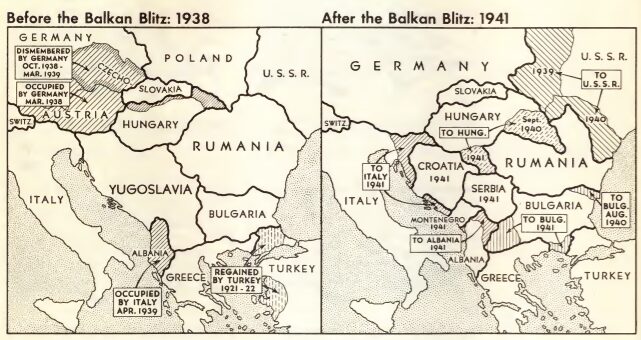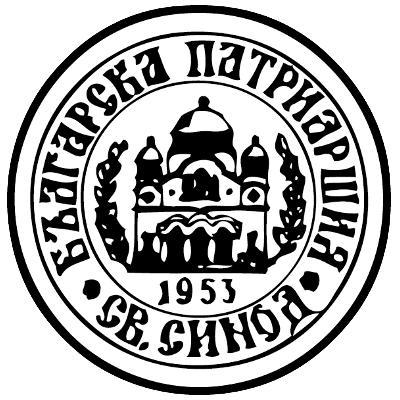|
Bulgaria–Greece Relations
Bulgaria–Greece relations refer to bilateral relations between Bulgaria and Greece. Due to the strong political, cultural and religious ties between the two nations, (the majority of Bulgarians and Greeks practice the Eastern Orthodox faith), Bulgaria and Greece today enjoy excellent diplomatic relations and consider each other a friendly nation and an ally. Greece is a strong supporter of Bulgaria's Euro-Atlantic integration and entry to the Schengen Area. Bulgaria and Greece share common political views about the Balkans, the enlargement plans of the European Union and the rest of the world, with Bulgaria having been a supporter of Greece's stance on the Macedonia naming dispute (1991–2019). Modern relations between the two countries were established in 1908 and are regarded as excellent despite the Axis occupation of Greece by Bulgaria, Italy and Germany during World War II. History The common heritage of both nations played a significant role in the close relations ... [...More Info...] [...Related Items...] OR: [Wikipedia] [Google] [Baidu] |
Bulgaria
Bulgaria (; bg, България, Bǎlgariya), officially the Republic of Bulgaria,, ) is a country in Southeast Europe. It is situated on the eastern flank of the Balkans, and is bordered by Romania to the north, Serbia and North Macedonia to the west, Greece and Turkey to the south, and the Black Sea to the east. Bulgaria covers a territory of , and is the sixteenth-largest country in Europe. Sofia is the nation's capital and largest city; other major cities are Plovdiv, Varna and Burgas. One of the earliest societies in the lands of modern-day Bulgaria was the Neolithic Karanovo culture, which dates back to 6,500 BC. In the 6th to 3rd century BC the region was a battleground for ancient Thracians, Persians, Celts and Macedonians; stability came when the Roman Empire conquered the region in AD 45. After the Roman state splintered, tribal invasions in the region resumed. Around the 6th century, these territories were settled by the early Slavs. The Bulgars, led by Asp ... [...More Info...] [...Related Items...] OR: [Wikipedia] [Google] [Baidu] |
Glagolitic Script
The Glagolitic script (, , ''glagolitsa'') is the oldest known Slavic alphabet. It is generally agreed to have been created in the 9th century by Saint Cyril, a monk from Thessalonica. He and his brother Saint Methodius were sent by the Byzantine Emperor Michael III in 863 to Great Moravia to spread Christianity among the West Slavs in the area. The brothers decided to translate liturgical books into the contemporary Slavic language understandable to the general population (now known as Old Church Slavonic). As the words of that language could not be easily written by using either the Greek or Latin alphabets, Cyril decided to invent a new script, Glagolitic, which he based on the local dialect of the Slavic tribes from the Byzantine theme of Thessalonica. After the deaths of Cyril and Methodius, the Glagolitic alphabet ceased to be used in Moravia for political or religious needs. In 885, Pope Stephen V issued a papal bull to restrict spreading and reading Christian services ... [...More Info...] [...Related Items...] OR: [Wikipedia] [Google] [Baidu] |
Cold War
The Cold War is a term commonly used to refer to a period of geopolitical tension between the United States and the Soviet Union and their respective allies, the Western Bloc and the Eastern Bloc. The term '' cold war'' is used because there was no large-scale fighting directly between the two superpowers, but they each supported major regional conflicts known as proxy wars. The conflict was based around the ideological and geopolitical struggle for global influence by these two superpowers, following their temporary alliance and victory against Nazi Germany and Imperial Japan in 1945. Aside from the nuclear arsenal development and conventional military deployment, the struggle for dominance was expressed via indirect means such as psychological warfare, propaganda campaigns, espionage, far-reaching embargoes, rivalry at sports events, and technological competitions such as the Space Race. The Western Bloc was led by the United States as well as a number of other First W ... [...More Info...] [...Related Items...] OR: [Wikipedia] [Google] [Baidu] |
Balkans Campaign (World War II)
The Balkans campaign of World War II began with the Italian invasion of Greece on 28 October 1940. In the early months of 1941, Italy's offensive had stalled and a Greek counter-offensive pushed into Albania. Germany sought to aid Italy by deploying troops to Romania and Bulgaria and attacking Greece from the east. Meanwhile, the British landed troops and aircraft to shore up Greek defences. A ''coup d'état'' in Yugoslavia on 27 March caused Adolf Hitler to order the conquest of that country. The invasion of Yugoslavia by Germany and Italy began on 6 April 1941, simultaneously with the new Battle of Greece; on 11 April, Hungary joined the invasion. By 17 April the Yugoslavs had signed an armistice, and by 30 April all of mainland Greece was under German or Italian control. On 20 May Germany invaded Crete by air, and by 1 June all remaining Greek and British forces on the island had surrendered. Although it had not participated in the attacks in April, Bulgaria occupied part ... [...More Info...] [...Related Items...] OR: [Wikipedia] [Google] [Baidu] |
Balkans Campaign (World War I)
The Balkans theatre, or Balkan campaign was a theatre of World War I fought between the Central Powers (Austria-Hungary, Kingdom of Bulgaria, Bulgaria, German Empire, Germany and the Ottoman Empire) and the Allies of World War I, Allies (Kingdom of Serbia, Serbia, Kingdom of Montenegro, Montenegro, French Third Republic, France, the United Kingdom of Great Britain and Ireland, United Kingdom, Russian Empire, Russia, Kingdom of Italy, Italy and later Kingdom of Greece, Greece). The campaign began in 1914 with three failed Austro-Hungarian Serbian campaign of World War I#1914, offensives into Serbia. A new attempt a year later by the combined forces of Austria-Hungary, Germany and Bulgaria led to the Serbian campaign#1915, conquest and occupation of Serbia and Montenegrin campaign, Montenegro. The Serbian army did not surrender but Great Retreat (Serbian), retreated through the mountains of Albania and was evacuated to Corfu before reforming in Salonika a few months later. On the ... [...More Info...] [...Related Items...] OR: [Wikipedia] [Google] [Baidu] |
First Balkan War
The First Balkan War ( sr, Први балкански рат, ''Prvi balkanski rat''; bg, Балканска война; el, Αʹ Βαλκανικός πόλεμος; tr, Birinci Balkan Savaşı) lasted from October 1912 to May 1913 and involved actions of the Balkan League (the Kingdoms of Kingdom of Bulgaria, Bulgaria, Kingdom of Serbia, Serbia, Kingdom of Greece, Greece and Kingdom of Montenegro, Montenegro) against the Ottoman Empire. The Balkan states' combined armies overcame the initially numerically inferior (significantly superior by the end of the conflict) and strategically disadvantaged Ottoman armies, achieving rapid success. The war was a comprehensive and unmitigated disaster for the Ottomans, who lost 83% of their European territories and 69% of their European population. [...More Info...] [...Related Items...] OR: [Wikipedia] [Google] [Baidu] |
Second Balkan War
The Second Balkan War was a conflict which broke out when Bulgaria, dissatisfied with its share of the spoils of the First Balkan War, attacked its former allies, Serbia and Greece, on 16 ( O.S.) / 29 (N.S.) June 1913. Serbian and Greek armies repulsed the Bulgarian offensive and counter-attacked, entering Bulgaria. With Bulgaria also having previously engaged in territorial disputes with Romania and the bulk of Bulgarian forces engaged in the south, the prospect of an easy victory incited Romanian intervention against Bulgaria. The Ottoman Empire also took advantage of the situation to regain some lost territories from the previous war. When Romanian troops approached the capital Sofia, Bulgaria asked for an armistice, resulting in the Treaty of Bucharest, in which Bulgaria had to cede portions of its First Balkan War gains to Serbia, Greece and Romania. In the Treaty of Constantinople, it lost Adrianople to the Ottomans. The political developments and military preparations f ... [...More Info...] [...Related Items...] OR: [Wikipedia] [Google] [Baidu] |
World Wars
A world war is an international conflict which involves all or most of the world's major powers. Conventionally, the term is reserved for two major international conflicts that occurred during the first half of the 20th century, World WarI (1914–1918) and World WarII (1939–1945), although historians have also described other global conflicts as world wars, such as the Seven Years' War and the Cold War. Etymology The ''Oxford English Dictionary'' cited the first known usage in the English language to a Scottish newspaper, ''The People's Journal'', in 1848: "A war among the great powers is now necessarily a world-war." The term "world war" is used by Karl Marx and his associate, Friedrich Engels, in a series of articles published around 1850 called ''The Class Struggles in France''. Rasmus B. Anderson in 1889 described an episode in Teutonic mythology as a "world war" (Swedish: ''världskrig''), justifying this description by a line in an Old Norse epic poem, "Völuspá: fo ... [...More Info...] [...Related Items...] OR: [Wikipedia] [Google] [Baidu] |
Balkan Wars
The Balkan Wars refers to a series of two conflicts that took place in the Balkan States in 1912 and 1913. In the First Balkan War, the four Balkan States of Greece, Serbia, Montenegro and Bulgaria declared war upon the Ottoman Empire and defeated it, in the process stripping the Ottomans of its European provinces, leaving only Eastern Thrace under the Ottoman Empire's control. In the Second Balkan War, Bulgaria fought against the other four original combatants of the first war. It also faced an attack from Romania from the north. The Ottoman Empire lost the bulk of its territory in Europe. Although not involved as a combatant, Austria-Hungary became relatively weaker as a much enlarged Serbia pushed for union of the South Slavic peoples. The war set the stage for the Balkan crisis of 1914 and thus served as a "prelude to the First World War". By the early 20th century, Bulgaria, Greece, Montenegro and Serbia had achieved independence from the Ottoman Empire, but large eleme ... [...More Info...] [...Related Items...] OR: [Wikipedia] [Google] [Baidu] |
Ottoman Sultan
The sultans of the Ottoman Empire ( tr, Osmanlı padişahları), who were all members of the Ottoman dynasty (House of Osman), ruled over the transcontinental empire from its perceived inception in 1299 to its dissolution in 1922. At its height, the Ottoman Empire spanned an area from Hungary in the north to rebel in the south and from Algeria in the west to Iraq in the east. Administered at first from the city of Söğüt since before 1280 and then from the city of Bursa since 1323 or 1324, the empire's capital was moved to Adrianople (now known as Edirne in English) in 1363 following its conquest by Murad I and then to Constantinople (present-day Istanbul) in 1453 following its conquest by Mehmed II. The Ottoman Empire's early years have been the subject of varying narratives, due to the difficulty of discerning fact from legend. The empire came into existence at the end of the 13th century, and its first ruler (and the namesake of the Empire) was Osman I. According to l ... [...More Info...] [...Related Items...] OR: [Wikipedia] [Google] [Baidu] |
Ecumenical Patriarch Of Constantinople
The ecumenical patriarch ( el, Οἰκουμενικός Πατριάρχης, translit=Oikoumenikós Patriárchēs) is the archbishop of Constantinople (Istanbul), New Rome and '' primus inter pares'' (first among equals) among the heads of the several autocephalous churches which compose the Eastern Orthodox Church. The ecumenical patriarch is regarded as the representative and spiritual leader of many Orthodox Christians worldwide. The term ''ecumenical'' in the title is a historical reference to the Ecumene, a Greek designation for the civilised world, i.e. the Roman Empire, and it stems from Canon 28 of the Council of Chalcedon. The Ecumenical Patriarchate of Constantinople is one of the most enduring institutions in the world and has had a prominent part in world history. The ecumenical patriarchs in ancient times helped in the spread of Christianity and the resolution of various doctrinal disputes. In the Middle Ages they played a major role in the affairs of the Eastern ... [...More Info...] [...Related Items...] OR: [Wikipedia] [Google] [Baidu] |
Bulgarian Orthodox Church
The Bulgarian Orthodox Church ( bg, Българска православна църква, translit=Balgarska pravoslavna tsarkva), legally the Patriarchate of Bulgaria ( bg, Българска патриаршия, links=no, translit=Balgarska patriarshiya), is an autocephalous Orthodox jurisdiction. It is the oldest Slavic Orthodox church, with some 6 million members in Bulgaria and between 1.5 and 2 million members in a number of European countries, the Americas, Australia, New Zealand and Asia. It was recognized as autocephalous in 1945 by the Ecumenical Patriarchate of Constantinople. History Early Christianity The Bulgarian Orthodox Church has its origin in the flourishing Christian communities and churches set up in the Balkans as early as the first centuries of the Christian era. Christianity was brought to the Balkans by the apostles Paul and Andrew in the 1st century AD, when the first organised Christian communities were formed. By the beginning of the 4th ce ... [...More Info...] [...Related Items...] OR: [Wikipedia] [Google] [Baidu] |

.png)





